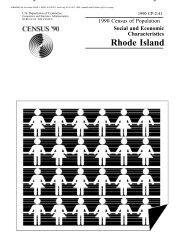Untitled - Rhode Island Historical Society
Untitled - Rhode Island Historical Society
Untitled - Rhode Island Historical Society
Create successful ePaper yourself
Turn your PDF publications into a flip-book with our unique Google optimized e-Paper software.
a<br />
4<br />
126 "NrAS SHE CLOTHED \rITH THE RENTS PAID FOR THESE WRETCHED ROO\<br />
dramatis personae and the forceful pleas for cross-class alliances to eradicate<br />
the ills of the factory system. Instead, wyman sought to describe, almost scientifically;<br />
the factory villages "srrung like beads along the [Blackstone] river.,,s,<br />
During the past eighty years, she declared, caste distinctions had evolved<br />
between owners and workers in these villages. \Thereas the two classes had<br />
once lived and worked side by side, they were now removed from one another.<br />
The institution of employer-owned housing was "a powerful engine of control'<br />
over the workers, and it could be "a tremendous lever in the hands of an unjus<br />
person."8-- Included in the series is a sympathetic description of a strike by male<br />
textile workers in Fall River. Disillusioned in her advoc acy of a cross-ciass solu<br />
tion to the inhumanity of the mill, rflyman was now tentatively endorsing labor<br />
unions, strikes, and other more confrontational methods.ss<br />
By the time \(yman testified on behalf of the Factory Inspectors Act at the<br />
<strong>Rhode</strong> <strong>Island</strong> stare House in 1893, other women activists had taken up the<br />
cause of the state's female operatives. In 1889 a number of women's organizations,<br />
including the <strong>Rhode</strong> <strong>Island</strong> rToman suffrage Association and the<br />
woman's christian Temperance union, had banded together as the <strong>Rhode</strong><br />
<strong>Island</strong> Council of Women to push for legislative initiatives favorable ro women<br />
and children.se The following year the council proposed legislation that would<br />
regulate hours and working conditions for women and children, and that wou1,<br />
mandate a female factory inspector to oversee compliance with the act.r0 The<br />
Factory Inspecrors Act-which regulated child labor, sanitary conditions, and<br />
hours of employment and insured the appointment of a woman factory inspector<br />
to oversee implementation-was passed by the General Assembly in 1g94..,<br />
Significantly, the first woman to hold the post of femaie factory inspector in<br />
<strong>Rhode</strong> <strong>Island</strong>, Fanny Purdy palmer, was one of chace's associates.e2 sfhether<br />
wyman's Atlantic Montbly stories and essays and chace,s ,,Factory \fomen an;<br />
Girls of New England" had helped shape the consciousness of those in the<br />
<strong>Rhode</strong> <strong>Island</strong> women's movement is not easy to document, but the advocaq, ol<br />
wyman and her mother undoubtedly mirrored the growing awareness among<br />
these middle-class reformers that the conditions of female factory operatives<br />
were a matter of critical concern.e3<br />
wyman published several more articles about factory women during the 1g90s.<br />
In her final contribution-"Girls in a Factory vailey," a two-part piece that<br />
appeared inthe Atlantic Monthly in the fall of 1g96-she presented a series of<br />
studies of individual operatives and their families that she had known over the<br />
years.ea Although intended to resemble the factual case studies of her .,Studies<br />
of Factory Life," these sketches were crafted as carefuliy as the fiction of<br />
Pouerty Grass.In their artfully simple first-person narrative, they reveal much<br />
about'wyman's lifelong and intimate day-to-day connection with the women<br />
operatives of valley Falls-their requests for money, for advice, for assisrance;<br />
her visits to their homes; her concern about their welfare; her interest in their<br />
families. More than anything, these short pieces reveal the inextricable bonds<br />
that connected wyman to her working-class sisters in valley Falls.<br />
\fyman's simple accounts are poignant and compelling. one sketch tells the<br />
story of Ellen McKay, a woman who had lost the use of her legs in an accident<br />
when she was ten years old and now spent her days housekeeping for her<br />
family, using her arms to drag herself around the flat. when Nilyman learned<br />
that Ellen had not been "down street" since her accident some thirteen years<br />
before, she offered to take her for a carriage ride. After describing her excursion











